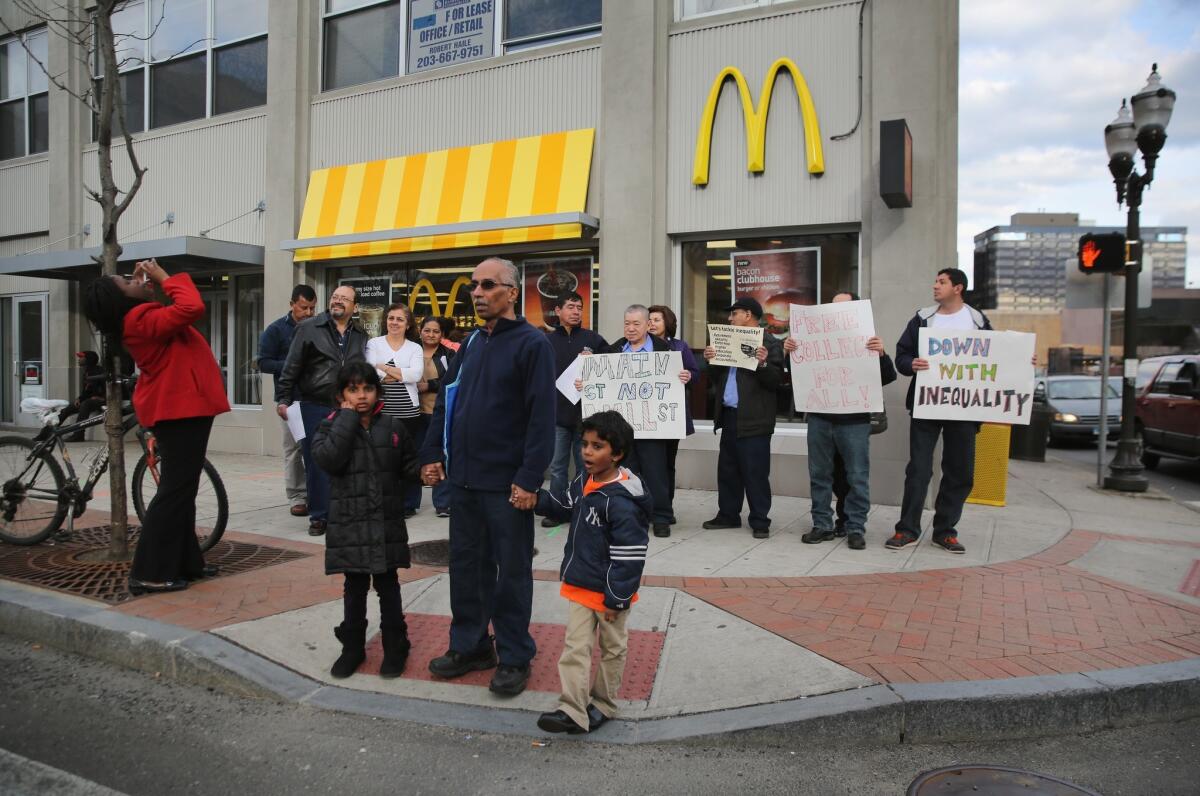Just who exactly benefits from a minimum wage hike? Take a look

- Share via
Reporting from Washington — President Obama stood in the East Room of the White House on Wednesday after Republicans blocked a minimum wage hike bill and argued that “they prevented a raise for 28 million hardworking Americans.”
That number sounded high -- a lot higher than ones Republican lawmakers used as they voted against the measure. GOP critics says it’s mostly teenagers and young people who rely on minimum wage jobs, not the poor.
Turns out the truth, which is often murky in Washington politics, sits somewhere beneath the partisan rhetoric.
It’s true that only about 3.6 million people are paid at or below the federal minimum wage of $7.25 an hour, according to the Labor Department. That’s less than 5% percent of the nation’s hourly workers.
But Democrats’ estimate of 28 million may not be as exaggerated as Republicans say.
Nearly half of the states have set their own wage floors higher than the current federal minimum but lower than the $10.10 Democrats have proposed this mid-term election year.
Looping in those workers means more than 16 million Americans would benefit from the federal wage hike, according to various studies, including the nonpartisan Congressional Budget Office.
Add to that the so-called “ripple effect” -- when employers raise the overall wage scale to reflect a new minimum wage in order to attract and reward better employees. That means another 11 million workers would see a pay raise, according to other studies. The Brookings Institute’s Hamilton Project puts the numbers even higher.
Together, that pushes the tally closer to the 28 million that Obama and Labor Secretary Tom Perez used throughout this week’s debate, surrounding themselves with low-wage workers for the campaign photo op.
Still, critics ask, aren’t most of these workers young people, flipping burgers at their first jobs -- as Republican Gov. Scott Walker has said he and Rep. Paul Ryan did growing up in Wisconsin -- rather than heads of households trying to support a family on minimum wage?
Yes and no. True, 50% of those earning at or below minimum wage are between 16 and 24 years old, according to the Labor Department. But that means the other half are 25 or over. And figures show that older employees are making up a greater share of minimum-wage workers than they have in the past.
Advocates also note that 10 million children live in families with a low-wage worker earning less than $10.10 an hour. Full-time minimum wage workers make about $15,000 a year, not enough to clear the federal poverty line of $16,000 for a family of two -- one parent, one child. Pew notes that “fully half” the minimum wage workers are women.
Meddling with public policy always involves trade-offs, and adjusting the minimum wage is no different.
Jobs would almost certainly be lost if the minimum wage was raised, a point Republicans argued as they voted in almost a strict party-line against advancing the measure in the Senate.
Total employment would be reduced by about 500,000 over the two years of staged wage increases to $10.10, the CBO said.
That’s not nothing at a time when the languid economy remains unable to add enough jobs to get to full employment. Economists would be thrilled if a fraction of as many jobs were added each month. Many do not expect unemployment rates to decline substantially for a few more years.
These are the choices Congress faces as lawmakers wrestle with their votes, which won’t be easier during an election year. Polls show most Americans agree with the minimum wage hike but are also concerned about lost jobs.
One bright spot for any lawmakers still wavering on the issue: They’ll likely have a chance to do it all over again. Sensing that the minimum wage issue is a sure bet to gin up their base, Democrats promise to hold vote after vote during the campaign season.
Twitter: @lisamascaroinDC
More to Read
Sign up for Essential California
The most important California stories and recommendations in your inbox every morning.
You may occasionally receive promotional content from the Los Angeles Times.











